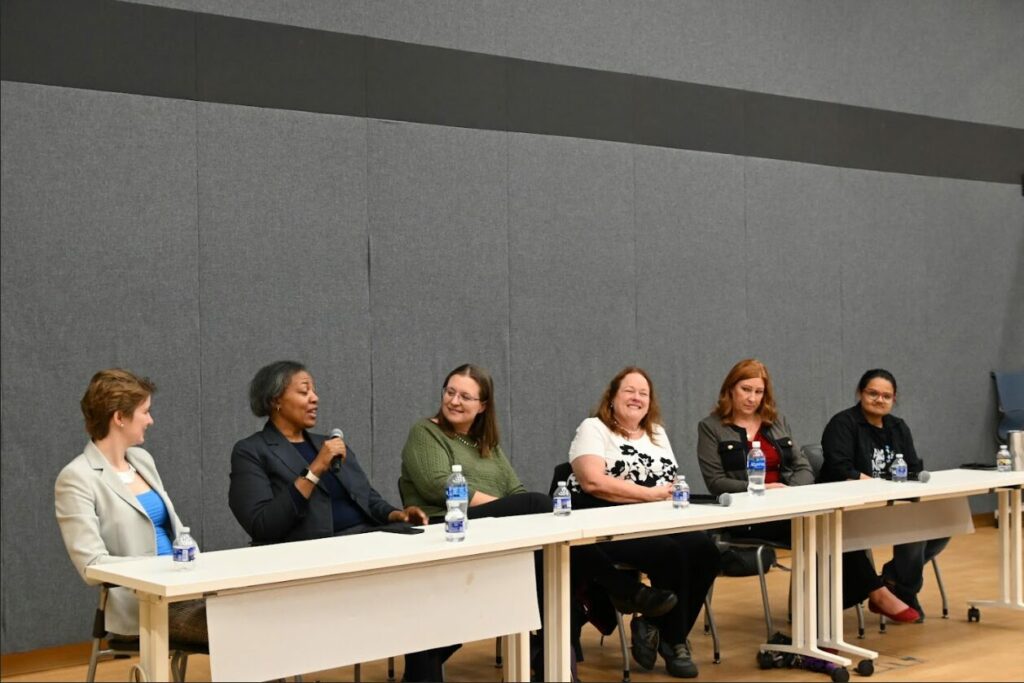Women in STEM share stories of perseverance in male-dominated field, encourage women to pursue excellence
4 min read
Six women in STEM fields talked about their successes and career difficulties. | Abbey Magnet, The Weekly Ringer
by EMMA KINGKEO
Staff Writer
On March 15, six women from varying STEM fields convened in the Digital Auditorium for a panel as part of UMW’s 2024 Women’s History Month Celebration. They advised students on how to overcome gender discrimination, achieve a work-life balance and become successful in difficult careers based on their real-life experience in the workplace.
The panel was hosted by the James Farmer Multicultural Center and OPTICA,—a “society dedicated to promoting the generation, application, archiving and dissemination of knowledge in the field” of which UMW has a chapter.
The panel pertained to trends caused by the lack of female representation in STEM fields. As a woman working in physics, an extremely male-dominated field, Shraddha Agrawal was the only woman in many of her classes at the Centre for Excellence in Basic Sciences—an institute affiliated with the University of Mumbai. Once she found a position in experimental atomic physics, she was the only woman in her lab for three years.
While this has been a typical experience for women in STEM for generations, Agrawal recommended that women persevere in the field with confidence and competency.
“I think the best way to get around is by just exhibiting your competence and mastery over the field that you’ve chosen,” said Agrawal. “And if you choose to be confident about it, then nothing should be able to stop you.”
The panelists also addressed the difficult decision to go into STEM at all in light of gender discrimination in the field. In addition to the heavy workload, there is also the matter of making time for family; many women struggle with working in the STEM field because of its extremely time-consuming nature.
Kari Soniat, a data analyst and director of analytics for the Virginia Risk Sharing Association, struggled with establishing herself in her career as a single mother. Even in the information technology field—where jobs can often be remote and flexible with odd hours—she has decided to stay where she is for the sake of her family—despite being able to be in a higher position.
“It does have to be a conscious choice that you make, and you have to stand up and say ‘I’m not going to do this or that because I choose my family first,’” she said. “And you may lose opportunities, but I agree that ultimately the better choice [is] choosing your family.”
Karen Inman, a fractional CIO of several companies, never thought she would end up in information technology. Though she was never intrigued by technology growing up, she was heavily interested in science as a child and earned a bachelor’s and master’s degree in geology. However, through a one-off attempt at solving a computer program on the job, she found her calling and recommended that others do the same.
“Find something that’s interesting and that you have passion around,” Inman said. “I think what has kept me in this space is intellectual curiosity. Every time I turn around, there’s a new problem to solve. There’s something new and exciting to learn.”
Agrawal also noted the importance of mentors in furthering one’s proficiency, regardless of the student’s level of learning.
“It’s important to have mentors who you could talk to,” she said. “That will allow you to solve certain problems and also get the experience without actually going to the experience yourself. I think reaching out to people and building those relationships to get into a field is very important.”
Similarly, Inman recommended asking questions and learning how to seek out mentors. To her, many professionals enjoy sharing their expertise, and mentoring helps both the student and the teacher by enriching their understanding. From her experience, students should not be concerned about bothering them or being rejected.
“What I have found is that people love to share their knowledge about what they have,” she said. “They want to help you be successful. It’s very rare that you find someone who’s really trying to put you down.”
Regarding secondary skills needed to be successful in STEM, technical systems designer Lauren E. Johnson recommended taking unnecessary classes to expose oneself to a broader way of thinking.
“Try taking a course that has nothing to do with your major,” Johnson said. “Because the more diverse skills that you have getting out into the workforce, the more marketable you’re going to be.”
Patrice Wilmont, the deputy chief information security officer of the U.S. Internal Revenue Service, added to this notion by depicting how her introverted tendencies harmed her growth. Missing and ignoring opportunities to create connections and interact with others hindered her success.
“It didn’t come naturally to me to build those relationships,” she said. “And as I evolved and really learned to do that better, my job got better.”
The students who attended the panel found the speakers encouraging and practical as they connected to at least one element of the panel.
Junior chemistry major Amina Walcott said that the panel was eye-opening regarding the ever-changing requirements of the STEM field. As a chemistry major, she has no experience with coding or software development, so its rapidly increasing popularity has led her and many others to feel pressured to learn.
“I think that computer science is going to be really important [in our professions],” Walcott said. “It’s an important asset to have, and I don’t have it.”
“I liked how they had diverse people in different academic, kind of coming from different academic fields to the actual workforce,” said Lordina Agyekum, a junior biomedical sciences major. “So just having that insight really helped out.”


